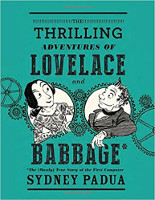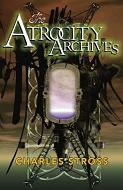 Ian Sales is a UK author, editor (both for books and websites), and publisher; who grew up in the Middle East before returning to the UK to enthral us with his tales of spaceflight as we know it (and then some more) that he could not do himself. His motto/tagline, on his own blog, is “It doesn't have to be right... it just has to sound plausible”, which very nicely sums up his writing, especially the Apollo Quartet, of which All That Outer Space Allows is the 4th and final instalment. Unless you count Dreams of the Space Age as the 5th one, of course... but not everybody is of the Douglas Adams school of counting series.
Ian Sales is a UK author, editor (both for books and websites), and publisher; who grew up in the Middle East before returning to the UK to enthral us with his tales of spaceflight as we know it (and then some more) that he could not do himself. His motto/tagline, on his own blog, is “It doesn't have to be right... it just has to sound plausible”, which very nicely sums up his writing, especially the Apollo Quartet, of which All That Outer Space Allows is the 4th and final instalment. Unless you count Dreams of the Space Age as the 5th one, of course... but not everybody is of the Douglas Adams school of counting series.
The books and stories in the Apollo Quartet are only loosely connected, but all are based on and extrapolated from the US space program during the space race. All of them have some point of departure, where they branch off from spaceflight history as we know it, or where they continue where our history left off.
All That Outer Space Allows is a bit of a departure from this format of the previous 3 books – not only is it one step removed from actual spaceflight activity and told through the viewpoint of an observer, but it also does not contain the trappings in the form of acronym lists, mission listings etc – kept in Apollo project font and forma – which gave the earlier books their own, slightly grubby retro-feeling. Instead the story is interspersed with faux NASA and other contemporary (-looking) lists, announcements, and press clippings which underpin the events in the story. One real fun piece was a faux SF Encyclopedia article, putting the story itself into a larger framework of Ginny's life, by outlining the larger cornerstones in her past and future.
Instead of projected spaceflight history we get what I felt was Ian's most 'fiction' story in the quartet. Not because the other stories aren't fiction (they are – all of them start at a point in spaceflight history and extrapolate from there in a direction our history did not take), but because here the initial premise is fictionalised, too – I guess writing about an actual astronaut and his wife in the way this is written would have been ever so slightly iffy...
But I'm getting ahead of myself. All That Outer Space Allows follows the fortunes of one Capt. Walden J. Eckhardt, USAF, and experimental test pilot whom we join at Edwards AFB. Walden applied for the X15 programme and was turned down – and boy is he still sore about that. But now he has been selected as a NASA astronaut as part of an intake of 19 new astronauts (for the sake of the story and its fictional elements he and his wife are taking the place of real-life James Irwin and his wife Mary). But this is not the story of Walden Eckhardt, he's only the foil used to tell the story of Ginny, his wife – mostly told through her eyes, her introspection, and her description of events.
You see – Ginny might not be eligible to be an astronaut, but she's got her own take on spaceflight in her career as SF author. It is worth noting that in this world SF is written and consumed predominantly by women; males will - if they write - frequently write under female pen-names to be taken more seriously by the SF community. I found this a curious and interesting departure from our world and its history (and even, still, present in the genre).
The title plays on Ginny's freedom in her 'Inner Space' where she invents, lives, writes fantastic stories; and the 'Outer Space' of society and its expectations placed on an 'Astronaut Wife', concerning appearance, conduct, and how they support their husbands. All That Outer Space Allows is really not very much, she feels.
The way Ginny chafes against her imposed limits, but accepts them, essentially, as God-given-that's-how-the-world-works is somewhat sad to read.
As part of the book we actually get to read Ginny' short story 'The Spaceships Men Don't See', which she sells during the story told (it is based on/inspired by her life and the move to Houston).
One thing which really sets this book apart from the other 3 in the series (and most other books, I guess) is that we get regular intercessions where the author breaks down the 4th wall, and explains his characters and their motivations, and progresses the story without the use of exposition.
This did not bother me as much as such devices can at times – the flow of the prose into and out of these is smooth and so these intrusions do not jar.
Still, you can speculate on why this is in the shape it is. There are loads of research that went into this, loads of preparation for the faux background. But the foreground consists of half-acted-out exhibition; sometimes it feels like Sales gave up on the book and didn't want to spend the time dramatising events? Or because the scope was too big or too small?
I felt that the parts which are here worked, but somehow they feel aimless. Like this is an overly long exhibition of Ginny's limited scope – and somehow missing something which feels like a main thread, a dramatic story arc beyond the backdrop of Waldens career. Again, somehow the size does not fit the scope?
In the end this has all the makings of a much bigger story/book, but I suspect that the approach required to make this work would have blown the scope of and approach to the Quartet as it stands way beyond what this does already.
So the overall impression was that this is clever on ever so many levels, and goes no-where. Just like Ginny, really.
One notable point in the book are the chapter titles: T-minus, Liftoff, Pitch&Roll Manoeuvre, Max Q – all in relation to the story, figuratively and very fittingly. A typical example on how cleverly constructed these stories are.
The book follows up the story with a number appendices, albeit not the usual ones which kept appearing in the Quartet. Instead we get
List of writers and editors, real ones, mentioned in the story
List of the members of the Astronauts' Wives Club
List of Astronauts at that point in history
List of other key actors
Further reading – I would think most of this is 'housewife'/feminist SF, as discussed in the story
Bibliography, and other sources
There's a lot here on the process of writing, on inspirations, motivation, on the why we do it and the why we don't. Told through Ginny, of course.
Essentially a book about writing, both as the story told, and as an exemplar, what with all the underpinnings exhibited and explained by the author.
Both a fascinating story, an interesting exhibition worth reading, and a missed opportunity for either something smaller and more concentrated, or something much bigger, ambitious, and complex.
More Ian Sales
Title: All That Outer Space Allows
Author: Ian Sales
Series: Apollo Quartet
Series Number: 4/4
Reviewer: Markus
Reviewer URL: http://thierstein.net
Publisher: Whippleshield Books
Publisher URL: http://www.whippleshieldbooks.com
Publication Date: 2015
Review Date: 180603
ISBN: 9780993141737
Price: UKP
Pages: 159
Format: Hardback
Topic: Spaceflight History
Topic: Feminism













